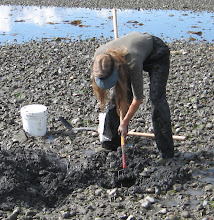Tuesday, October 2, 2012
9th Circuit Panel Halts PortMac Rail Extension
Anchorage, AK- Alaska families and salmon fisheries won a major court victory this week when the Ninth Circuit Court of Appeals ruled that all construction related to the controversial Port MacKenzie rail project is to be halted pending full review of the case by the court. The court cited serious questions regarding the project’s purpose and need, and the potential for irreparable harm to the Port Mackenzie area as leading factors in its decision.
Alaska has a long track record of ushering through expensive and unnecessary transportation projects with a lack of accountability and oversight, often resulting in local communities bearing the long-term cost.
“We already have three tidewater ports in Southcentral Alaska and we don’t need to waste public money on another,” says Bob Shavelson of Cook Inletkeeper. “Just like the Mat-Su Borough’s unused $80 million ferry that’s now for sale, the proposed expansion of Port of MacKenzie is wasteful and unnecessary.”
The rail company applied for a permit to build more than 35 miles of track and fill nearly 96 acres of wetlands and streams that serve as home to five species of wild Alaskan salmon. The new rail line would open the door for shipping Alaska coal overseas at the expense of local families, landowners, and salmon fisheries.
“The construction of what is in essence a 35 mile long dike through an area with extensive wetlands which currently provide nutrients and surface and ground water to the Little Susitna and Fish Creek watersheds will alter current flow patterns and presents a risk of substantial harm from a fish and wildlife perspective,” said Lance Trasky, a retired Alaska Fish and Game biologist.
Trasky warns that the solid fill rail extension from Houston to Port McKenzie will damage the physical and chemical environment, alter and fragment fish and wildlife habitat, introduce invasive species, and harm water quality along and within the transportation corridor. “Salmon—and the sport and commercial fisheries that depend on salmon—could be harmed for years to come,” he says.
The rail spur further threatens Cook Inlet and Mat Su Valley salmon runs that are already in trouble. The U.S. Department of Commerce declared a salmon disaster in Cook Inlet earlier this month, after state fisheries managers shut down commercial set net fisheries due to low King salmon returns. The Mat Su Valley sport fisheries have also experienced numerous restrictions and closures over the past decade.
“As a local landowner, I know the issues and the history of this project,” says Grace Whedbee, Big Lake resident. “The railroad extension has been pushed through without proper planning and would destroy our primary recreational areas.”
Expanding the Port of MacKenzie and building a new rail line could open the door for foreign companies to ship Alaska coal to Asia from proposed coal mines in the Mat-Su Valley. Usibelli Coal Company is already proposing to build the Wishbone Hill coal strip mine, a move that would harm hundreds of families across the valley with blasting, trucking, and potential water damage.
“The coal from more mining would go overseas to benefit our competitors in Asia, yet we would bear the costs of harm to our salmon runs, clean water, and good jobs we already have based on tourism and recreation,” said Bonnie Zirkle, hunting guide and Palmer resident.
The lawsuit involves the Surface Transportation Board’s deficient licensing and environmental analysis and is pending in the Ninth Circuit Court of Appeals. Argument is scheduled for November 8. Mat Su Borough and the Alaska Railroad Corporation have intervened in that proceeding.
-##-
Subscribe to:
Comments (Atom)



